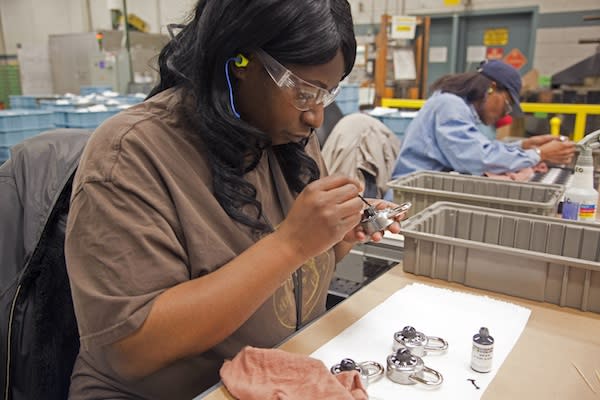 The Ticket
The TicketCan Obama’s plan for ‘insourcing’ help revive U.S. manufacturing?

President Obama toured a Master Lock factory in Milwaukee on Wednesday to urge manufacturers to return jobs to the United States-- part of a wider plan by his administration to increase the number of domestic manufacturing jobs.
"Right now we have an excellent opportunity to bring manufacturing back -- but we have to seize it," Obama said. The president praised Master Lock during his State of the Union Address last month for bringing back to its Milwaukee plant around 100 jobs that previously had been moved to China.
Obama calls this "insourcing": his administration's push to bring off-shored manufacturing jobs back home. In 2011, for the second straight year, the number of manufacturing jobs in the United States increased, after declining every year since 1998. Since December 2009, the sector has added 300,000 jobs. It added 50,000 last month alone, the biggest monthly increase in a year. In addition to Master Lock, companies like Ford, Honda, General Electric, Caterpillar and Intel have insourced jobs.
"More and more companies like Master Lock are now insourcing," Obama added in Wednesday's appearance. "Deciding that if the cost of doing business here isn't too much different than the cost of doing business in places like China, then why wouldn't you rather do it right here in the United States of America?
At an 'Insourcing American Jobs' forum held last month, Obama urged a reorientation of the economy toward manufacturing. "I don't want America to be a nation that's primarily known for financial speculation and racking up debt buying stuff from other nations," he said. "I want us to be known for making and selling products all over the world stamped with three proud words: 'Made in America.' "
To encourage the trend, the Obama administration wants to scrap tax deductions for shipping jobs overseas, and offer new incentives for returning them to the United States. The administration is also pushing for a $2 billion per year tax credit to encourage manufacturers to invest in struggling communities, among other measures.
It's not clear to what extent insourcing can help to replace the 8 million jobs lost during the Great Recession. For several decades, the United States has been transitioning to a service-based economy--a development that would be difficult to reverse.
Read Zachary Roth and Daniel Gross at Yahoo Finance on what's behind the insourcing push.
And watch Daniel Gross of Yahoo Finance interview Boston Consulting Group's Harold Sirkin about why insourcing could be the wave of the future:
Chinese labor is growing more expensive, with annual wage increases of 15 percent prevalent in the country's industrial coastal regions. But wages would have to rise much more sharply in China in order for manufacturers to think about making low-margin goods in which labor is the primary cost--T-shirts, toys, and small electronics--in the United States again.
And thanks to the euro zone's struggles, the dollar has been growing more attractive to investors. As the Wall Street Journal recently explained, that may give European manufacturers a pricing advantage over their American counterparts in the competition to sell goods to emerging markets.
Still, falling wages in the United States--thanks to high unemployment, weakened unions, and the continued growth of lower-cost manufacturing in lower-cost states in the south--have helped the insourcing trend. Transportation, supply chain risks, and other costs also are helping to make the United States a better deal.
Obama's message dovetails with his political interests. Midwestern manufacturing hubs like Wisconsin, Ohio and Michigan are swing states that figure to be crucial to his re-election prospects.
More popular Yahoo! News stories:
• New Santorum ad features Romney lookalike as gun-wielding 'Rombo' firing mud at opponent
• Top Line: What Romney is thinking
• How Rick Santorum, unafraid to talk about poverty, differs from the GOP on economic policy
Want more of our best political stories? Visit The Ticket or connect with us on Facebook, follow us on Twitter, or add us on Tumblr. Handy with a camera? Join our Election 2012 Flickr group to submit your photos of the campaign in action.
